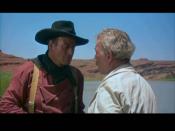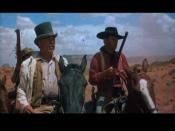Why Spaghetti Westerns Should Be Simply Westerns
It is argued that true Westerns all conform to the same mold of the prewar Westerns: A lonely hero who wanders the West looking to settle down, but is never able to give up the violent life he has led. John Cawelti says the Western takes place on the border between two lands, between two eras, and with a hero who remains divided between two value systems (Altman, 220). Schatz describes the Western world as one of a precarious balance in which forces of civilization and savagery are locked in a struggle for supremacy (p. 47). I do not believe this description allows for the inclusion of many Westerns created before the First World War, beginning with The Great Train Robbery (1903), and after the Second World War. In fact, despite The Great Train Robbery's widespread acceptance as the first Western, it is considered to be a mix of the travel genre, and the railway subgenre (Altman, 34).
His definition only truly suits the movies made during the height of the Western genre between the 1930's and the 1950's (p. 46). I will be focusing on two films that are known to be quite illustrative of their respective Western niches: The Searchers (1956) and For a Few Dollars More (1965). I intend to show that an American Western by an American director may be differently styled, but in no sense more of a Western than one from an Italian director with a very different adaptation of the genre.
The Western hero exists on the periphery of both the community and the wilderness and never loses touch with either. The hero is motivated to uphold civilization by his own code of honor. This often leads him to acts of vengeance (Schatz, 51). The Searchers...



Corrections and comments
I wrote this essay after a lot of research. Trust me it is a good paper. The grade was given to me by one of the hardest grading teachers in the department, so I think using "some" of the ideas from this paper would do you well. Also for some reason when I copied it, the website inserted stray question marks instead of apostrophes and some random ones. Delete them.
11 out of 12 people found this comment useful.